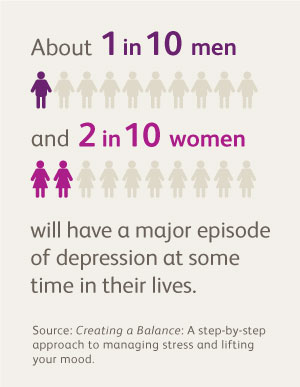What’s the best treatment for depression?

Whether you try antidepressants, therapy, both, or neither, KPWHRI’s Dr. Gregory Simon points to 3 ‘active ingredients’ for feeling better
People seeking help for depression often ask: What’s the best treatment? The answer depends on a number of factors, including how serious your depression is.
For people with severe depression, research shows that a combination of psychotherapy and antidepressant medication is more effective than either one alone.
For those with moderate symptoms of depression, both medication and evidence-based forms of psychotherapy such as cognitive behavioral therapy are effective first-line treatments. On average, the two approaches are about equally effective, so it makes sense to choose the one you most prefer.
And what about mild depression? Studies have shown that medication is no more effective than a placebo; so doctors don’t generally recommend medication treatment for patients whose depression is not that bothersome. Psychotherapy can certainly help reduce mild symptoms of depression, but most people can improve or recover from mild depression without specific treatment at all. So although psychotherapy can be a reasonable thing to do, it’s often not needed.
Whether you decide to work on your depression with a therapist or work independently, the “active ingredients” for overcoming depression are the same:
- Schedule positive activities
Feeling depressed often leads to withdrawing from activities that you find positive or rewarding. But withdrawing from those activities typically leads to feeling more depressed. There’s strong evidence that scheduling specific positive activities can help you overcome depression. It may help to think small—that is, start with something you know you can do. Also, make it specific, committing to when, where, with whom you’ll do the activity. And plan to do the activity soon because the more time you have to think about it, the more likely you won’t get started.
- Recognize and tame exaggerated negative thoughts
Feeling depressed colors the way you see the world, and pessimistic and self-critical thoughts reinforce feeling depressed. But you can break out of this cycle, by starting to notice or “call out” exaggerated negative thoughts—and to recognize them for what they are: Just thoughts, that’s all. There are various strategies for taming negative thoughts. One is to take a rational approach. That is, you look at the evidence and ask, “Is this thought true? Or is it an exaggerated or unreasonable response to my situation.” Another approach is to distance yourself from negative thinking by using mindfulness techniques. Examples include quieting your mind through meditation or learning to be a calm observer of upsetting thoughts rather than engaging with them. Over time, mindfulness allows you disengage from negative thoughts so they lose their power over you.
- Break down problems into manageable pieces
Depression is often set off by real problems. And problems seem bigger and more overwhelming when you feel depressed. To get past feeling overwhelmed, it helps to focus on one problem to start with, try to break that problem down into smaller pieces, and pick one specific thing you can do to begin a piece-by-piece effort to make matters better. Progress on one problem builds confidence, making it much easier to take on other problems.
Learn more from Kaiser Permanente with this helpful overview of depression, its symptoms, causes, and risks. Get more information on the types of treatment for depression.
Gregory Simon, MD, MPH, is a senior investigator at Kaiser Permanente Washington Health Research Institute and a Kaiser Permanente psychiatrist.



